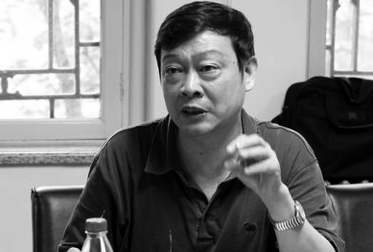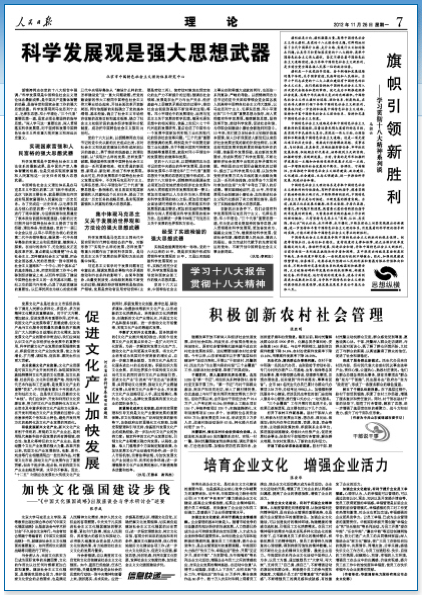Earlier this month we took a look at what Hu Jintao’s political report to the 18th National Congress had to say about cultural policy in China — specifically, the focus on building China as a “socialist cultural power” (社会主义文化强国) to offset perceived Western cultural dominance.
A report in today’s People’s Daily summarizes the discussion — basically, a recapitulation of official Party policy — that happened recently at an academic forum accompanying the launch of a new book edited by Guo Jianyu (郭建宁), a professor of philosophy at Peking University.
According to the People’s Daily report, participants at the Beijing forum discussed the importance of “cultural soft power” development and the building of a “socialist cultural power” in achieving “national cultural security (国家文化安全).

[ABOVE: Peking University professor Guo Jianyu, one of China’s leading proponents of “soft power” development.]
Professor Guo is one of China’s most outspoken pundits on the issue of “cultural soft power” development. In this piece, written right on the heels of Hu Jintao’s inclusion of “soft power” in the political report to the 18th National Congress in 2007, Guo wrote:
Harvard University professor Joseph Nye in the United States raised the concept of “soft power” in the 1990s. Today our understanding of cultural “soft power” is more complete, as shown by the fact that overseas we have now built more than 100 “Confucius Institutes” and we have had steady successes in hosting “Year of Chinese Culture” events. Zbigniew Brzezinski wrote in The Grand Chessboard that there are four marks of a great nation, namely: a developed economy, a strong military, strong science and technology, an attractive culture. History and reality both attest to the fact that the rise of great nations is not only an economic phenomenon but also a cultural phenomenon. It’s not just about economic development; it’s also about cultural prosperity.
Guo’s new compilation is called China’s Cultural Power Strategy (中国文化强国战略). The book is one among a wave of such books on China’s soft power strategy to emerge since late 2008. But it might make a useful reference for those wanting to know more about how official China is conceptualizing culture, and turning that understanding of culture into strategy — what the People’s Daily article calls a “blueprint.”

[ABOVE: Today’s edition of the People’s Daily reports (bottom left) on a forum held in Beijing about “cultural soft power.”]
A partial translation of the People’s Daily article follows:
“Accelerating Our Pace in Building a Cultural Strong Nation“
Zhang Xuecheng (张学成)
People’s Daily
November 26, 2012, 07
The “Academic Research Forum and Publishing Launch Forum for China’s Cultural Power Strategy“, hosted by the School of Marxism at Peking University and the Higher Education Publishing House, was held not long ago in Beijing. Drawing on the book China’s Cultural Power Strategy, edited by Guo Jianyu (郭建宁), the participants studied such issues as the great importance of building a socialist cultural power (社会主义文化强国) and how to put a strong cultural nation strategy into effect.
It was the view of participants that cultural soft power (文化软实力) has already become a core element of international competition. The role of culture is now more pronounced and important than it has been at any time before. [in the view of the participants]. Building a socialist cultural power is a necessary task in the enhancement of our country’s comprehensive national strength (综合国力) and the protection of our national cultural security (国家文化安全). It is also an objective need in satisfying the people’s cultural demands (精神文化需求) and preserving the people’s cultural rights and interests.
. . .
Participants emphasized that [we] must build a socialist cultural power with a high degree of cultural consciousness (文化自觉) and cultural confidence (文化自信). The blueprint has now been drawn, the task is already clear. The key now is to place all of the ideas and actions of the Party and society together with the spirit and prescriptions of the Central Committee of the Chinese Communist Party, fulfilling them and putting them into full effect. We must further raise our ideological understanding and increase our cultural consciousness, correctly grasping the principles of cultural development, actively taking on the historical responsibility of building a socialist cultural power . . . Further strengthening cultural soft power, promoting cultural self-improvement, liberating our ideas, seizing opportunities, using [our] diverse cultural resources, leveraging the institutional superiority of the socialism, accelerating the pace of the building of a socialist cultural power.




















